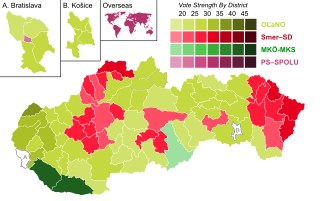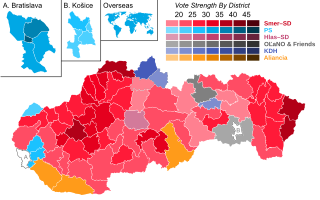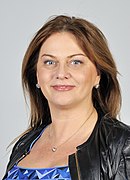Politics of Slovakia takes place in a framework of a parliamentary representative democratic republic, with a multi-party system. Legislative power is vested in the parliament and it can be exercised in some cases also by the government or directly by citizens.

The single transferable vote (STV), sometimes mistakenly conflated with proportional ranked choice voting (P-RCV), is a multi-winner electoral system in which each voter casts a single vote in the form of a ranked-choice ballot. Voters have the option to rank candidates, and their vote may be transferred according to alternative preferences if their preferred candidate is eliminated or elected with surplus votes, so that their vote is used to elect someone they prefer over others in the running. STV aims to approach proportional representation based on votes cast in the district where it is used, so that each vote is worth about the same as another.

Mikuláš Dzurinda is a Slovak politician who was the prime minister of Slovakia from 30 October 1998 to 4 July 2006. Dzurinda is the founder and leader of the Slovak Democratic Coalition (SDK) and then the Slovak Democratic and Christian Union (SDKÚ–DS). From 2002 to 2006, his party formed a coalition government with the Christian Democratic Movement (KDH), the Alliance of the New Citizen (ANO), and the Party of the Hungarian Coalition (SMK–MKP).

The Slovak Democratic and Christian Union – Democratic Party is a liberal-conservative, Christian-democratic political party in Slovakia. The SDKÚ-DS was a member of the Centrist Democrat International and was a member of the European People's Party until 2018, when it was expelled due to inactivity.

Open list describes any variant of party-list proportional representation where voters have at least some influence on the order in which a party's candidates are elected. This is as opposed to closed list, in which party lists are in a predetermined, fixed order by the time of the election and gives the general voter no influence at all on the position of the candidates placed on the party list.

Monika Beňová is a Slovak politician who has been a member of the European Parliament since 2004. She is a member of the centre-left Direction-Social Democracy party SMER-SD. SMER-SD is a member of the Party of European Socialists. She presently serves on the Committee on the Environment, Public Health and Food Safety. At the same time she serves as a Quaestor of the European Parliament and therefore she is a member of the European Parliament's Bureau. In present she has opposite views as her mother party - Smer, for example on European Union, NATO, LGBTQ rights in Slovakia, conflict in Ukraine and so on.

The Nitra Region is one of the administrative regions of Slovakia. It was first established in 1923 and from 1996 exists in its present borders. It consists of seven districts and 354 municipalities, from which 16 have a town status. The economy of the region focuses more on agriculture, than in other Slovak regions. Nitra is its seat, largest city, and cultural and economic center.

The Bratislava Region is one of the administrative regions of Slovakia. Its capital is Bratislava. The region was first established in 1923 and its present borders exist from 1996. It is the smallest of the eight regions of Slovakia as well as the most urbanized, most developed and most productive by GDP per capita.

Ružinov is a borough of Bratislava, the capital of Slovakia, located in the Bratislava II district. It is the city's second most populated borough, housing over 80,000 inhabitants and its Nivy neighbourhood is the place of the emerging new city center of Bratislava. Ružinov features extensive residential areas, as well as major industrial facilities and transport infrastructure including the Milan Rastislav Štefánik international airport and the D1 motorway.

Parliamentary elections were held in Slovakia on 12 June 2010. The elections were contested by eighteen parties, six of which passed the 5% threshold for sitting in parliament. Despite the incumbent Smer of Prime Minister Robert Fico winning a plurality, the new government consisted of a coalition led by the Slovak Democratic and Christian Union – Democratic Party's Iveta Radičová and included KDH, SaS and Most-Hid. However, her government fell on 11 October 2011 following a vote of no confidence with a new election called for 10 March 2012.

Parliamentary elections were held in Slovakia on 10 March 2012 to elect the 150 members of the National Council. The elections followed the fall of Prime Minister Iveta Radičová's Slovak Democratic and Christian Union – Democratic Party-led coalition in October 2011 over a no confidence vote her government had lost because of its support for the European Financial Stability Fund. Amidst a major corruption scandal involving local center-right politicians, former Prime Minister Robert Fico's Direction – Social Democracy won an absolute majority of seats.

Elections to the European Parliament took place in Slovakia on 24 May 2014. It was the third European election which took place in Slovakia.
The following lists events that happened during 2015 in Slovakia.

Parliamentary elections were held in Slovakia on 5 March 2016 to elect the 150 members of the National Council. The ruling left-wing populist Direction – Social Democracy (SMER–SD) party remained the strongest party, but lost its majority. The Slovak Democratic and Christian Union – Democratic Party (SDKÚ-DS), which led the government between 2000–06 and 2010–12, was defeated heavily, failing to cross the electoral threshold and losing its representation in the National Council. The centre-right Christian Democratic Movement (KDH) also failed to cross the threshold for the first time since 1990, whilst the far-right nationalist Kotleba – People's Party Our Slovakia (ĽSNS) entered parliament for the first time.

Parliamentary elections were held in Slovakia on 29 February 2020 to elect all 150 members of the National Council.

In the run up to the 2016 Slovak parliamentary election, various organisations carry out opinion polling to gauge voting intention in Slovakia. Results of such polls are displayed in this article.

Early parliamentary elections were held in the Slovak Republic on 30 September 2023 to elect members of the National Council. Regular elections were scheduled to be held in 2024. However, on 15 December 2022 the government lost a no-confidence vote. Subsequently, the National Council amended the Constitution so that an early election could be held on 30 September 2023. This was the first snap election in the country since 2012.
The Christian Union is a Slovak right-wing conservative political party. The chairwoman of the party since 2019 is Anna Záborská. At present, he has five deputies of the National Council of the Slovak Republic, elected on the candidate of the party OĽANO-NOVA-KÚ-ZZ.

Vladimír Ledecký, M.Sc. is a Slovak politician, member of the National Council of the Slovak Republic and former state secretary at the Ministry of Investments, Regional Development and Informatization of the Slovak Republic. He was a member of the presidency of the ZA ĽUDÍ party, where he acted as a guarantor for regional development. From 1998 to 2020 he was the mayor of Spišský Hrhov, from 2005 to 2022 he also served as a deputy of the Prešov self-governing region. He is currently a member of the SaS parliamentary club.



















